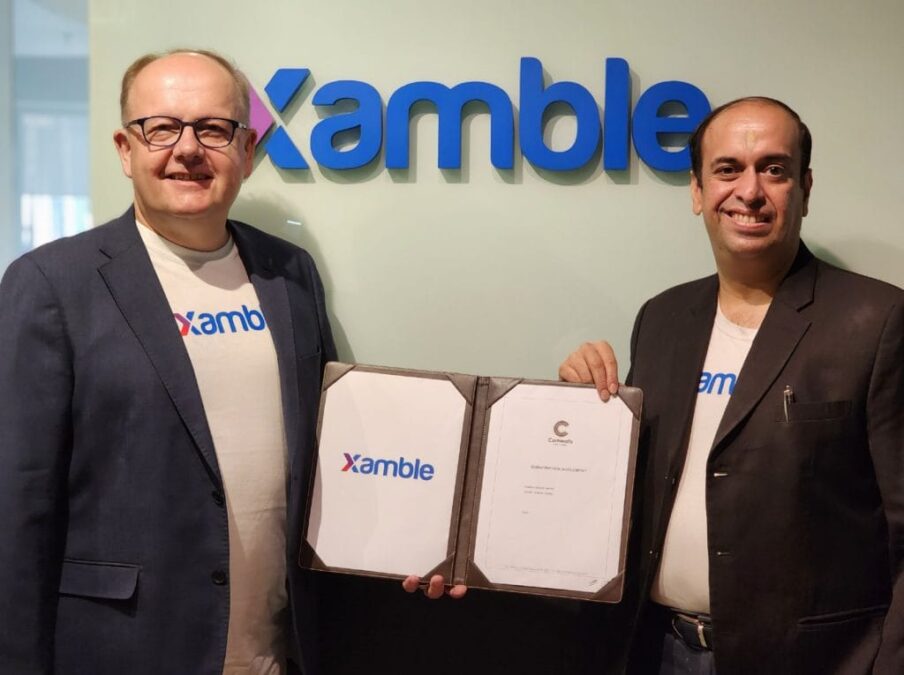
Nuffnang on Key Influencer Marketing Trends for 2024
27 Nov 2023
Executive Chairman Ganesh Kumar Bangah presentation at Automic Invest 2023
04 Dec 2023THE semiconductor sector aside, there are not that many listed tech companies run by Malaysians and fewer still that deliver on their investor promises. Tech companies also have a long gestation period before they show any significant earnings. Many tech startups fall by the wayside.
One promising but little known tech company owned by a Malaysian but listed on the Australian Securities Exchange (ASX) is called Xamble Group Ltd.
Formerly called Netccentric Ltd, Xamble is a digital platform that connects influencers and brands.
The group’s major shareholder and executive chairman Ganesh Kumar Bangah acquired this company from two squabbling shareholders back in early 2020 just before the outbreak of Covid-19.
His goal is to grow Xamble into South-East Asia’s leading entity in the influencer- and digital-marketing space.
The technopreneur, who hails from Johor, has some feathers in his cap. Those who followed his story, will know that he is the founder of MOL Global Inc, a company that was owned mainly by tycoon Tan Sri Vincent Tan but run by Ganesh.
MOL was listed on Bursa Malaysia in 2003 with Ganesh becoming its chief executive officer at the age of 23. He developed the business to become one of the region’s leading online payment gateways that had an e-wallet back in the early 2000s – at a time when the concept of financial technology had yet to take off.
The company was subsequently privatised and went on to be listed on the Nasdaq in October 2014, and at one point it held a market capitalisation of over US$500mill. But the stock faced investor backlash about a month later when it delayed its third quarter results while a key person at the company had also resigned.
Additionally, its American depositary share prices had fallen below the minimum bid price of US$1 to remain listed. Nineteen months down the road MOL was delisted with its shares valued at a mere US$15mil.
Singaporean computer-gaming brand Razer subsequently acquired the company for US$100mil.
Fast forward to today, and Ganesh is busy building the Kuala Lumpur-based Xamble as well as running his privately owned company called Commerce DotAsia Ventures Sdn Bhd (Commerce.Asia) which he started in 2016.
Commerce.Asia is an eCommerce play offering solutions for brands and businesses looking to sell online.
Early last year, it raised RM20mil via a crowd-funding exercise that was led by public-listed Paramount Corp Bhd which invested RM10mil.
That fundraising valued Commerce.Asia, which has a database of over 8.4 million small and medium enterprises across seven countries, at around RM135mil.
But it is Ganesh’s ownership of and ambitions for Xamble that are a more interesting story.
Ganesh paid A$0.015 per share or A$3mil for the 84% stake in Xamble, which was then making losses. It had A$3mil in cash which still sits in its coffers today.
To turn around its financials, the team improved operational efficiencies and created new products, leveraging on artificial intelligence and blockchain technologies. Coupled with the boost in eCommerce due to the pandemic, Xamble posted a profit, albeit a small one, in its financial year 2020 (FY20). Meanwhile, to drive growth, Ganesh transformed its services-based business model to a platform-centric one which allows the execution of multiple tasks on the same digital infrastructure. For this, it entered into a joint-venture with Commerce.Asia to spearhead the foray into live commerce.
Business grew and Netccentric rebranded as Xamble in March 2023.
Speaking to StarBizWeek, Ganesh says the name is derived from the core word “assemble” to reflect the company’s vision of assembling communities to bring value and synergies to the ecosystem of brands, influencers, and consumers.
He says influencer marketing is increasingly being tapped as an alternative method to reach consumers.
“Consumers are spending more time on social media. Therefore brands increasingly need to engage with target demographics or end consumers on these platforms.
“However, the cost of social-media advertising on platforms such as Facebook, TikTok and Snapchat has risen sharply. This has made influencer marketing more appealing as consumers tend to trust endorsements from credible third parties,” he adds.
However, brands often do not have control over influencer content, while it is also difficult to track sales generated from campaigns.
“This is where Xamble can help brands, influencers and consumers make more effective and informed decisions with our integrated strategy,” he says, adding that influencers can also match up with campaigns that align with their interests, plus manage their earnings directly from a mobile app.
For those in the digital marketing and tech space, the name Nuffnang is well known. It was the main business when Netccentric was listed in 2015, and still exists today as a flagship influencer-marketing platform.
Besides this, Xamble has two more core businesses – Sashimi, which provides digital-marketing solutions, while Plata & Punta offers digital marketing consultant services.
Fees are earned via campaigns or on a retainer basis. The group’s key markets are Malaysia, Singapore and Taiwan.
In the third quarter (3Q) of FY23, Xamble’s earnings before interest, taxes, depreciation, and amortisation grew 67%, while revenue was up 14% from a year ago.
According to Ganesh, it was also the best performing quarter for both Nuffnang and Plata & Punta this year.
“Nuffnang had seven new brand wins, bringing its total new clients for the three quarters of FY23 to 10. Meanwhile, Plata & Punta secured a major client in the education field.
“However Sashimi saw a decline in revenue due to a slowdown in clients’ spending as a result of the current weak consumer sentiment.”
Touching on the performance of the group’s new businesses, Ganesh says revenue for Xamble Live Commerce (its joint-venture with Commerce.Asia) grew 55% in 3Q.
Its Xamble Creators app, meanwhile, had 859 registered influencers as of Nov 1, 2023 with an estimated RM1.61mil in payments made to them since its launch in the 2Q of 2023.
Tech luminary Chmiel backs Xamble
A more interesting development is the entry of tech entrepreneur Georg Chmiel via an investment of A$400,000 in Xamble.
Chmiel, who joined the Xamble board in November, is known in the tech circle as a person who had been instrumental in growing disruptive online businesses such as iCarAsia and iProperty Group and successfully exiting them.
Ganesh says Chmiel’s backing is a “vote of confidence”, signalling a new phase of growth.
“Our target is the fast-growing South-East Asia influencer marketing space, which is expected to hit US$2.59bil in 2024. The region also enjoys high rates of internet adoption and mobile-data usage,” he says.
To achieve this, the company does not rule out mergers and acquisitions with potential companies in the region who may have the network but not the technology like Xamble.
“We are also looking to expand beyond the fast-moving consumer goods companies which make up the bulk of our clients.
“With A$3mil in the coffers, we have the strength and flexibility to fund the group’s growth goals,” adds Ganesh.
Presently, Xamble is small with a market capitalisation of a mere A$18mil.
It will be an interesting tech company to watch. But like all tech plays, it risks falling by the wayside, or it could well become one of the few tech success stories borne out of Malaysia.
SOURCE : https://www.thestar.com.my/business/business-news/2023/12/02/xamble-sets-stage-for-next-phase-of-growth/
One promising but little known tech company owned by a Malaysian but listed on the Australian Securities Exchange (ASX) is called Xamble Group Ltd.
Formerly called Netccentric Ltd, Xamble is a digital platform that connects influencers and brands.
The group’s major shareholder and executive chairman Ganesh Kumar Bangah acquired this company from two squabbling shareholders back in early 2020 just before the outbreak of Covid-19.
His goal is to grow Xamble into South-East Asia’s leading entity in the influencer- and digital-marketing space.
The technopreneur, who hails from Johor, has some feathers in his cap. Those who followed his story, will know that he is the founder of MOL Global Inc, a company that was owned mainly by tycoon Tan Sri Vincent Tan but run by Ganesh.
MOL was listed on Bursa Malaysia in 2003 with Ganesh becoming its chief executive officer at the age of 23. He developed the business to become one of the region’s leading online payment gateways that had an e-wallet back in the early 2000s – at a time when the concept of financial technology had yet to take off.
The company was subsequently privatised and went on to be listed on the Nasdaq in October 2014, and at one point it held a market capitalisation of over US$500mill. But the stock faced investor backlash about a month later when it delayed its third quarter results while a key person at the company had also resigned.
Additionally, its American depositary share prices had fallen below the minimum bid price of US$1 to remain listed. Nineteen months down the road MOL was delisted with its shares valued at a mere US$15mil.
Singaporean computer-gaming brand Razer subsequently acquired the company for US$100mil.
Fast forward to today, and Ganesh is busy building the Kuala Lumpur-based Xamble as well as running his privately owned company called Commerce DotAsia Ventures Sdn Bhd (Commerce.Asia) which he started in 2016.
Commerce.Asia is an eCommerce play offering solutions for brands and businesses looking to sell online.
Early last year, it raised RM20mil via a crowd-funding exercise that was led by public-listed Paramount Corp Bhd which invested RM10mil.
That fundraising valued Commerce.Asia, which has a database of over 8.4 million small and medium enterprises across seven countries, at around RM135mil.
But it is Ganesh’s ownership of and ambitions for Xamble that are a more interesting story.
Ganesh paid A$0.015 per share or A$3mil for the 84% stake in Xamble, which was then making losses. It had A$3mil in cash which still sits in its coffers today.
To turn around its financials, the team improved operational efficiencies and created new products, leveraging on artificial intelligence and blockchain technologies. Coupled with the boost in eCommerce due to the pandemic, Xamble posted a profit, albeit a small one, in its financial year 2020 (FY20). Meanwhile, to drive growth, Ganesh transformed its services-based business model to a platform-centric one which allows the execution of multiple tasks on the same digital infrastructure. For this, it entered into a joint-venture with Commerce.Asia to spearhead the foray into live commerce.
Business grew and Netccentric rebranded as Xamble in March 2023.
Speaking to StarBizWeek, Ganesh says the name is derived from the core word “assemble” to reflect the company’s vision of assembling communities to bring value and synergies to the ecosystem of brands, influencers, and consumers.
He says influencer marketing is increasingly being tapped as an alternative method to reach consumers.
“Consumers are spending more time on social media. Therefore brands increasingly need to engage with target demographics or end consumers on these platforms.
“However, the cost of social-media advertising on platforms such as Facebook, TikTok and Snapchat has risen sharply. This has made influencer marketing more appealing as consumers tend to trust endorsements from credible third parties,” he adds.
However, brands often do not have control over influencer content, while it is also difficult to track sales generated from campaigns.
“This is where Xamble can help brands, influencers and consumers make more effective and informed decisions with our integrated strategy,” he says, adding that influencers can also match up with campaigns that align with their interests, plus manage their earnings directly from a mobile app.
For those in the digital marketing and tech space, the name Nuffnang is well known. It was the main business when Netccentric was listed in 2015, and still exists today as a flagship influencer-marketing platform.
Besides this, Xamble has two more core businesses – Sashimi, which provides digital-marketing solutions, while Plata & Punta offers digital marketing consultant services.
Fees are earned via campaigns or on a retainer basis. The group’s key markets are Malaysia, Singapore and Taiwan.
In the third quarter (3Q) of FY23, Xamble’s earnings before interest, taxes, depreciation, and amortisation grew 67%, while revenue was up 14% from a year ago.
According to Ganesh, it was also the best performing quarter for both Nuffnang and Plata & Punta this year.
“Nuffnang had seven new brand wins, bringing its total new clients for the three quarters of FY23 to 10. Meanwhile, Plata & Punta secured a major client in the education field.
“However Sashimi saw a decline in revenue due to a slowdown in clients’ spending as a result of the current weak consumer sentiment.”
Touching on the performance of the group’s new businesses, Ganesh says revenue for Xamble Live Commerce (its joint-venture with Commerce.Asia) grew 55% in 3Q.
Its Xamble Creators app, meanwhile, had 859 registered influencers as of Nov 1, 2023 with an estimated RM1.61mil in payments made to them since its launch in the 2Q of 2023.
Tech luminary Chmiel backs Xamble
A more interesting development is the entry of tech entrepreneur Georg Chmiel via an investment of A$400,000 in Xamble.
Chmiel, who joined the Xamble board in November, is known in the tech circle as a person who had been instrumental in growing disruptive online businesses such as iCarAsia and iProperty Group and successfully exiting them.
Ganesh says Chmiel’s backing is a “vote of confidence”, signalling a new phase of growth.
“Our target is the fast-growing South-East Asia influencer marketing space, which is expected to hit US$2.59bil in 2024. The region also enjoys high rates of internet adoption and mobile-data usage,” he says.
To achieve this, the company does not rule out mergers and acquisitions with potential companies in the region who may have the network but not the technology like Xamble.
“We are also looking to expand beyond the fast-moving consumer goods companies which make up the bulk of our clients.
“With A$3mil in the coffers, we have the strength and flexibility to fund the group’s growth goals,” adds Ganesh.
Presently, Xamble is small with a market capitalisation of a mere A$18mil.
It will be an interesting tech company to watch. But like all tech plays, it risks falling by the wayside, or it could well become one of the few tech success stories borne out of Malaysia.



